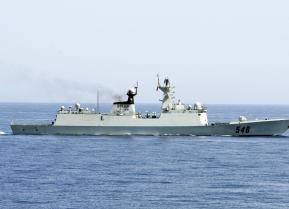China's Now Has a Super Weapon America's Navy Lacks: Railguns
China's futuristic electromagnetic railgun may already be the most powerful cannon to ever roam the high seas — ahead of schedule.
This is a good sign for the future of the Navy's powerful supergun, true. But with the Haiyang Shan prowling the high seas — and tensions between the U.S and Chinese navies at a boiling point — this funding may simply be too little, too late.
China's futuristic electromagnetic railgun may already be the most powerful cannon to ever roam the high seas — ahead of schedule.
In June, a U.S. intelligence assessment estimated that the Chinese military planned on fielding its own version of the electromagnetic railgun on naval vessels as early as 2025, far outstripping the Pentagon's truncatedefforts to develop its own version of the much-hyped supergun. Now, new photos appear to show the railgun perched on the bow of its test ship at sea.
This is clearly the Haiyang Shan, the same Type 072III-class landing ship that was spotted in January 2018 docked at the Wuchang shipyard in China's central Hubei province, the largest of the People's Liberation Army Navy's inland shipyards and a major production hub for the country's conventional submarines.
The Chinese railgun was first developed in 2011 and tested in 2014, but a People's Liberation Army-run news outlet claimed in February that the Chinese navy had achieved a "breakthrough" during sea trials for the new railgun. Indeed, the June U.S. intelligence assessment suggests the supergun underwent trials even earlier than the PLA said, with initial tests underway as early as December 2017.
Meanwhile, the Office of Naval Research was still trying to figure out how to fire multi-shot salvos with its version of the railgun amid budget challenges and changing research and development priorities within the Pentagon. As of now, the U.S. Navy has yet to successfully mount the railgun aboard a naval platform, although the service is reportedly integrating the necessary infrastructure to power the system in its next class of large surface combatant warships.
But in terms of actually developing an operational shipboard prototype, things may be looking up for the Navy. The 2019 National Defense Authorization Act included an additional $20 million for Innovative Naval Prototypes Advanced Technology Development (0603801N) explicitly to accelerate the development of a shipboard tactical demonstrator, well beyond the $15 million recommended by Rep. Jim Langevin, a Democrat from Rhode Island and co-chair of the Congressional Directed Energy Caucus, in last year's NDAA to help the railgun make the transition from shore to ship.
When taken with the additional $20 million allocated in the 2019 NDAA for the Army's distinct railgun efforts, this suggests that the Pentagon hasn't totally given up hope of fielding the supergun despite existing obstacles. "With China and Russia challenging our technological superiority, we cannot just play defense," said Langevin of the defense budget back in May 2018. "Instead, we must promote and accelerate the adoption of game-changing technologies including hypersonics, directed energy, and applications of artificial intelligence."
This is a good sign for the future of the Navy's powerful supergun, true. But with the Haiyang Shan prowling the high seas — and tensions between the U.S and Chinese navies at a boiling point — this funding may simply be too little, too late.
Image: Reuters.
This article originally appeared at Task & Purpose. Follow Task & Purpose on Twitter.
More Articles from Task & Purpose:
- 7 Veteran-Friendly Manufacturers That Are Hiring


